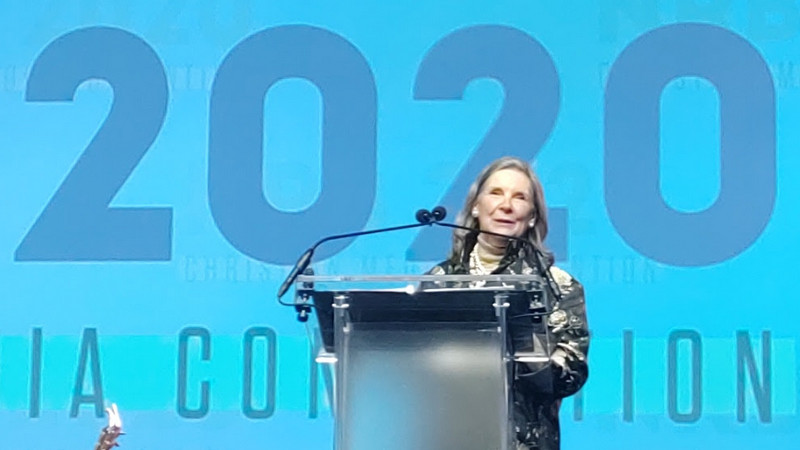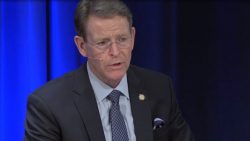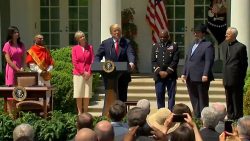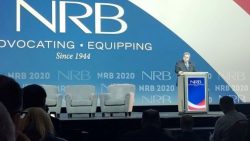The National Religious Broadcasters hosted its 2020 Christian media convention last week in Nashville last week, where the association’s leaders and guest speakers warned attendees of what they said were threats to religious liberty and freedom of speech by anti-freedom liberals and Big Tech.
Unlike the Conservative Political Action Conference or the Values Voter Summit, the NRB convention is not entirely about politics. Many of the ministries and media operations represented are focused more on evangelizing and spreading the gospel, and many of their staff took part in workshops offered on the nuts and bolts of surviving and thriving as a broadcaster in the current disruptive media environment. But when the presentations turned to policy and politics, they generally took a hard-right turn, which is not surprising given that the group’s chairman is religious-right broadcaster Janet Parshall, whose husband Craig serves as the organization’s general counsel. Craig Parshall is also a senior council at the American Center for Law and Justice, the legal group helmed by Jay Sekulow, a personal attorney to President Donald Trump.
The Trump administration was represented by Education Secretary Betsy DeVos and Attorney General William Barr, along with Sekulow’s son Jordan, who, like his father, is an ACLJ attorney and was a member of Trump’s legal team during the impeachment trial. Other right-wing political figures addressing the convention included Sen. Marsha Blackburn of Tennessee and former Arkansas governor and failed presidential candidate Mike Huckabee.
Allegations of anti-Christian persecution in the U.S. began even before the official opening session Tuesday evening. That afternoon, a forum focused on international evangelism featured Pastor Andrew Brunson, an American who faced harsh persecution and spent two years imprisoned in Turkey before pressure from the Trump administration won his release. Brunson said he was afraid that American Christians are not prepared for persecution coming their way in the U.S. “The media, political, the business classes, most of academia are becoming increasingly hostile to those who identify publicly with Jesus Christ and with his teaching,” Brunson said.
That message would be repeated frequently by convention speakers. Barr warned that courts and “totalitarian” progressives are promoting a culture of hostility toward religion.
In her opening address to the convention, Janet Parshall described Washington, D.C., as her “foreign mission field” and her job as host of a radio show as being “a war correspondent in Babylon.”
“I’m pretty convinced that most 21st Century Christians in America don’t have a clue about what it means to live in a hostile culture,” she said, unlike Christians living in hostile countries like China who she said expect fiery trials as part of their daily life. “I’m here to tell you, fiery trials are coming here.”
The NRB was founded 75 years ago, she said, when broadcast networks resisted broadcasting religious messages that were deemed divisive in “a far less hostile culture than we find ourselves in today.”
“Suit up!” she said. “It’s war! And we need to understand that!”
Politician-pundit Mike Huckabee warned, “If we do not stand and fight hard for the basic constitutional liberties and religious freedom, we not only will lose them, but the future generations will lose any understanding or knowledge of what this country is about.”
One front in the war being waged by the NRB is Silicon Valley, whose giant tech firms are repeatedly charged by right-wing activists with acting from an anti-conservative bias and imposing outright censorship on conservatives. (Gizmodo’s Tom McKay heard the same message last week at CPAC but had a hard time finding people who could give him concrete examples of the unjustified censorship they say they are facing.)
The technology conversation at NRB was complicated. Operationally, the internet was portrayed as the most powerful tool ever for evangelization, making it feasible to fulfill Jesus’s Great Commission and the biblical prophecy that all nations will be reached with the gospel. Workshops explored the use of social media tools that enable ministries and broadcasters to capture the attention of spiritually searching people online, and to learn from and mimic online marketing techniques deployed by corporations and other groups. One presentation about using the internet for “stealth evangelism” touted a video called “Love is Love” that presented an anti-gay message and went viral, racking up 6 million views with an ad budget of just $100.
But on the political side of things, Big Tech was portrayed as a repressive force led by people hostile to conservative evangelicals’ biblical worldview—this era’s version of those gatekeeping broadcasters that spurred NRB’s founding.
Craig Parshall declared that Silicon Valley leaders are “captive to the enemy” and “they don’t see the truth.” He claimed that the big online platforms are “closing down Christian opinions one at a time, with increasing ferocity.” Speaking of those who developed Silicon Valley enterprises, Parshall said, “If you look at the worldview, their life philosophy, it is antithetical to the gospel of Christ.”
A workshop called “Google vs. God” combined these messages, teaching people how to use digital tools and tactics in the face of what its presenter called HATE—a “Hostile Anti-Truth Environment”—online. The workshop leader said some Silicon Valley leaders have a “blasphemous belief system” but said that using the right techniques had helped his group get its messages to show up at the top of Google searches for questions like “Why am I here?” But it’s a constant struggle, he said, to deal with shifting algorithms and people down-voting results.
“So it’s a battle,” he said. “It’s a war.”
But the solution to conservative complaints about Big Tech is also complicated by their fervent belief in the free market and distrust of government regulation of private companies.
Blackburn described the fact that the same kind of platforms that have the power to create a nationwide town hall have also created a culture of hostility toward “traditional viewpoints” as an “impossible predicament.”
“Secular society has gotten very, very comfortable” with going beyond muting a person whose opinion they don’t like and trying to prevent them from being able to say what they have to say, according to Blackburn, an apparent reference to the deplatforming of some right-wing personalities based on anti-hate-speech policies of platforms such as Twitter and YouTube. “The left is so good at making limits sound reasonable,” she said, adding that companies default to censorship to appease the loudest voices in the room.
Blackburn warned that “if we don’t rein in these companies now, we are going to be in for some very tough times.” She said that she and other members of the Senate Judiciary Committee have created a technology task force and held roundtable discussions with Big Tech to find ways to address concerns over privacy and censorship without relying on overregulation and government mandates that would get in the way of innovation.
“I think that the problem is that we all are believers here in America in free enterprise,” said Craig Parshall, adding that his father was a successful businessman. “But we also believe in the value of free speech, particularly for the gospel of Jesus Christ. We need these platforms.”
Craig Parshall touted NRB’s John Milton Project for Digital Free Speech and a report he co-authored called “Chokepoint,” which he said he has been distributing on Capitol Hill. Parshall said that he and a colleague have come up with a solution that would protect free enterprise and free speech but he didn’t tell NRB attendees what it was. He said he’s saving it for an all-day conference on the future of technology he is attending this month.
Conference speakers’ warnings about a dire threat to religious freedom echo the rhetoric of religious-right political leaders and demonstrate a fear-based political strategy recently analyzed by scholar Paul Djupe. “A major strategy to keep conservative Christians unified in the 2020 election season is to ramp up perceived and anticipated persecution,” Djupe wrote at the Religion in Public blog. “As the story goes, Christians are under threat and the only thing that is holding back the persecution dam is Donald Trump and the Republican Party.”
Djupe dug deeper into statistics showing that evangelicals are almost twice as likely as Americans on the whole to believe that there is a lot of discrimination against American Christians. Djupe theorized that those beliefs were based on the communications that evangelicals consumed, not on their lived experience. He found evidence to support his theory; Christians living in more secular states—where you might think they would face greater prejudice and discrimination—were found less likely to believe that Christians face discrimination in the U.S. than those living in states with conservative Christian cultures. Djupe concludes that “if people believe that they will be persecuted and act accordingly, it helps generate the war they anticipated in their own minds.”
“That’s precisely the point of the elites [of their movement] encouraging these beliefs,” he added.
And that’s one reason conservative Christian media will be a powerful tool in Team Trump’s 2020 arsenal.









